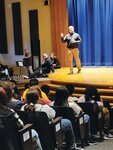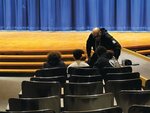Alex Snow loomed large in the prison yard. On a recent Friday morning, he looked even bigger in the Johnston High School auditorium.
In prison, Snow cultivated the friends he needed to watch his …
This item is available in full to subscribers.
We have recently launched a new and improved website. To continue reading, you will need to either log into your subscriber account, or purchase a new subscription.
If you are a current print subscriber, you can set up a free website account by clicking here.
Otherwise, click here to view your options for subscribing.
Please log in to continue |
|




Alex Snow loomed large in the prison yard. On a recent Friday morning, he looked even bigger in the Johnston High School auditorium.
In prison, Snow cultivated the friends he needed to watch his back. His size helped to make him popular among his fellow inmates, but it also made him a target.
One year, deep into a long sentence, visiting day rolled back around and Snow walked into the Adult Correctional Institutions (ACI) visiting room in Cranston. His mom was in the building.
“I’m dapping my boys up; I’m hugging their mothers,” Snow told the audience of Johnston eighth-graders gathered in the high school auditorium for a three-hour assembly. “I get to my table, and my mother says to me, ‘Where the hell do you think you are?’ She said, ‘You had football, martial arts, you had boxing. I worked three jobs; I had holes in my shoes. But you and your brothers had new shoes. And my reward from you is you’re the most popular person in hell.’”
Suddenly, a pin fell, striking the auditorium floor like a thunderclap.
“Make no mistake about it … that building in Cranston … is hell.”
Snow spoke and the kids were listening.
Called Out
A small group of four eighth-graders had been separated from the rest of the group earlier in the morning, at the start of the assembly. They were giggling, laughing, showing off a little, like eighth-graders sometimes do — especially cool eighth-graders. These boys were especially cool.
Snow had spent most of the past two hours sitting with these segregated troublemakers in the front row of the auditorium.
Snow knew the boys. Maybe not by name, but Snow knew them well. He was once them. He once had the same brash chip on his shoulder.
As Snow spoke, all four boys watched silently. When Snow mentioned his mother, each boy bowed his head slightly.
Suddenly, Snow recalled, after visiting day, his stature had slipped. He lost his prison optimism. Despite his physical prowess, Snow realized he was powerless behind bars.
“I cried myself to sleep over 3,000 nights,” Snow recalled.
And then, just weeks after visiting day, Snow lost his mother.
Prison officials coldly delivered the news. He was strip-searched and transported to the funeral home.
Snow’s brother, a state trooper, watched on with embarrassment as prison guards escorted the black sheep — the sibling inmate — to the casket to pay his final respects.
Snow said he came to realize he must have never loved his mother.
No doubt, he cared for his mother. But he never really loved her.
If he loved her, wouldn’t he have made better choices? If he loved his mother, wouldn’t he have treated her better?
When Snow broke free of prison-life, and the cycle that landed him there, he knew he wanted to work with kids. He eventually founded Instinctive Choices Outreach Mentorship.
Back, before prison, Snow thought he loved his mother. But it took visiting day behind bars to make him realize the truth. Now, he wants to wake up as many kids as possible before they break their mothers’ hearts.
FACT Over Fiction
Years later, on this side of the bars, Snow’s now one of a small group of former inmates who speak to Ocean State students, delivering a strong dose of reality.
Led by Johnston native Christopher B. Frenier, Probation & Parole Supervisor for the Rhode Island Department of Corrections (DOC), the FACT (Fostering Alternative Choices and Thinking) program has been going strong for close to a decade.
Bernier started the presentation by asking the students to “summon (their) inner adult.”
“I’ve had a few things happen to me lately and I’m in no mood for bullshit,” Frenier said, waking them up.
Spines straightened row by row.
“You’re going to hear some serious things,” Frenier warned the kids. “I’m going to pour my heart out to you. These people are going to pour their hearts out to you … I want you guys to be adults and give us three hours of your attention. And then do whatever you want … Just sit there and listen … Just be in the moment.”
Brother John Doe
Frenier’s brother, an addict, unwittingly inspired the FACT program.
“He died in 2013,” Frenier told the eight-graders. “He died of a heroin overdose in a hotel room.”
Frenier asked the students a few quick, sobering questions.
“What happens when you die and you don’t have an ID on you? Does anyone know? What do they call you?”
A few whispers in the audience quietly guessed the answer.
“John or Jane Doe,” Frenier repeated the correct answer. “Exactly.”
After his brother died the authorities identified his body through fingerprint analysis.
“He had an extensive criminal record,” Frenier recalled. “They matched his fingerprints … That’s the first thing they do. Second thing — they need eyes on the body.”
It was a Friday. Frenier was about to take his children on a vacation.
“It’s a call that I was expecting,” he remembered. “Why? Because my brother started screwing around at your age.”
Frenier thought back to his childhood; to his brother’s adolescence.
“He didn’t just start doing drugs,” Frenier recalled. “It was his attitude. Screwing around … giving the teachers a hard time. Giving my mom a hard time. Lying. Cheating. Stealing. Smoking weed. Smoking cigarettes. Started drinking early …”
That’s about when the group of four eighth-grade boys were called out and separated at the assembly. Frenier never stopped talking. The boys were moved up front and off to the side. Snow had words with them. They each, eventually, fell into line, listening silently to the morning’s life lesson.
“Yeah, It’s a joke,” Frenier told the students. “It’s a joke when you’re young. You think you’re invincible … Some of you are doing the same thing … You know who you are. We’re not here to scare you or anything like that. You guys are soon to be adults. You know what the right and wrong choices are. We’re just telling you what could happen if you go down that path.”
‘Open For Business’
“I work at the ACI,” Frenier told the kids. “We’re open for business. If we don’t have enough beds for you, we’ll make more. Or we’ll just pack you in with 1,000 people. We don’t care. Our doors are open for everyone. White. Black. Red. Blue. Woman. Man. Both. Who knows? We take everyone.”
“Right Alex?” He asked Snow. Snow, seated with the four boys, nodded in agreement. He nodded and looked down at the boys. The boys looked down at their hands.
“We take the sick,” Frenier said. “Healthy. Wheelchairs. One arm. No arms. We’ll take you.”
Frenier’s brother first went to jail for beating a homeless man.
“My whole life, up until the point when he died, (was spent) worrying that I was going to get a call in the middle of the night that he was dead,” Frenier recalled. “I wished he was dead. I told him, ‘Why don’t you just get it over with? You’re killing my mom.’”
Frenier’s brother sold their mother’s car for drugs in Holyoke, Massachusetts.
“That was a wonderful moment for me,” he remembered with sarcasm. “He was the best man at my wedding and decided to get so drunk that he could barely give the speech, and made an ass of himself. Every moment of my life was marred by him doing something, but yet I loved him. He was my brother. The same brother I loved, I wished dead.”
Cruel Wishes
Frenier’s brother had a long rap sheet. His stretches behind bars were punctuated by brief rehab stints.
“He went to jail and then convinced the judge to let him (go) to another rehab facility — probably his 18th he never finished — instead of locking him up,” Frenier recalled from his brother’s final stretch in jail. “I’ll never forgive the judge for doing that. I think he needed to drink gutter water at a state prison.”
Instead, his brother was granted yet another reprieve.
“He went to a facility … in Holyoke, Mass.,” Frenier said. “My mom dropped him off. He signed in. Five minutes later, he left. He got a hooker, some cocaine and a hotel room … He died, and whoever was with him left him there. They found him two days later.”
The kids listened. Some took turns walking out, taking bathroom breaks. Eventually, the morning’s speakers asked them to limit their trips to the toilet. The opening and closing of auditorium doors were starting to distract from the stories spilling out on the stage.
“This story is the reason I created this program,” Frenier admitted. “I was all banged up from this. I had anger. Rage. Guilt. Sadness. Everything wrapped into one. I mean, there was 25 years of him screwing up; 25 years of him ripping my mother’s heart out. I wanted to make his legacy — not a dead junkie, a John Doe ... The only way that I could think of is talk to kids your age, which is about the age where he started going wrong, that he started making the wrong choices.”
As a Matter of FACT
For the past five years, Nicholas A. Ferri Middle School Assistant Principal Freddie Skipworth has been helping to ensure the FACT presentation hits home for his students.
He introduced the morning’s speakers.
“Eighth grade, listen up please,” he told the students. “We are here for a good portion of the morning.” He called the assembly, “probably one of the most powerful things we do here at the school.”
“All of these individuals have taken time out of their day to speak to you so I hope, well I expect that you’ll give them the respect that they deserve,” Skipworth told the students. “That includes keeping your phone (away) … and paying attention … If you don’t, every one of them has no problem calling you right out. This is serious. There are some hard-hitting things that are gonna come up.”
Skipworth was right. The speakers helped the faculty keep the kids in line. Sitting still for three hours can be a “tough ask” for most adults. If the content was less than riveting, they probably would have lost all the kids during the first hour.
“It was so much better than in year's past because the presenters had a full venue and more time,” Skipworth said after the assembly. “In the past we have used our cafeteria and the distractions and time constraints have not made it as impactful. Since, we have received a number of commendations from parents about their child’s response to the presentation.”
Ferri hosts an annual HERO (Helping, Encouraging, and Respecting Others) month, “to provide our students with real-world experiences that will promote healthy decision-making, and provide first-hand knowledge of mental health struggles, relationship boundaries, substance use, the power of kindness, and other significant topics,” according to Skipworth. Throughout the month of March, the school had hoped to welcome guest speakers in to meet the students and share their life experiences.
The FACT presentation was the most impactful event scheduled for this year’s HERO month. HERO month has been going strong at Ferri since 2019.
“Each year we have welcomed returning and new speakers to share their life journeys and unique perspectives with our students in an attempt to share real-world experiences our students can fathom outside of the classroom,” according to Skipworth. “We have witnessed immense success year after year as our facilitators empower our students to reflect and enable change within themselves to reach their full potential.”
Parents had the opportunity to opt their children out of the assembly if they didn’t want them to attend the FACT presentation. Few took that option. Almost the entire eighth grade walked from Ferri, across Atwood Avenue, to the high school.
Both Snow and Frenier noted the precarious times in which our children live.
Warnings to kids about “smoking reefer” used to be a pastime packed with hyperbole. But now, with the scary prospect of commonplace fentanyl-laced recreational drugs, the very real possibility of overdose may be buried within that first joint.
“This is no time to experiment guys,” Frenier told the students. “Your experiment could be the last experiment you ever have. That’s not anecdotal. That’s not a scare tactic.”
Comments
No comments on this item Please log in to comment by clicking here